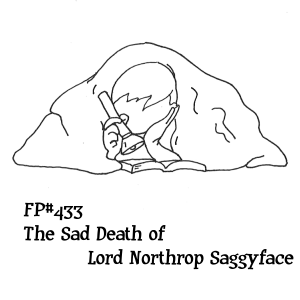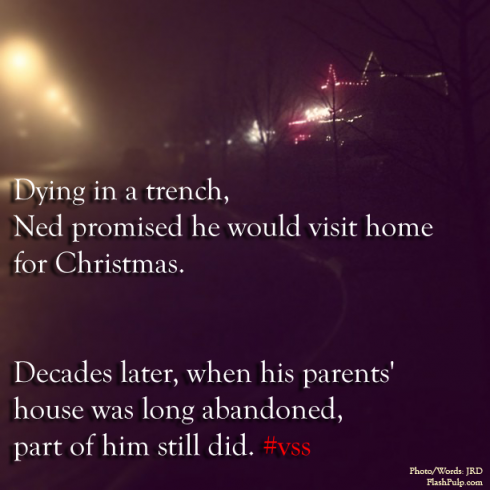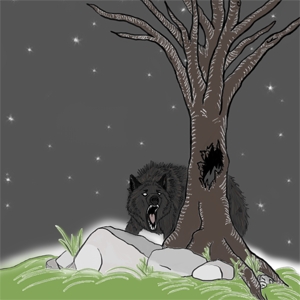FP457 – Go On
Welcome to Flash Pulp, episode four hundred and fifty-seven.
Tonight we present Go On
[audio:http://traffic.libsyn.com/skinner/FlashPulp457.mp3]Download MP3
This week’s episodes are brought to you by Gatecast!
Flash Pulp is an experiment in broadcasting fresh pulp stories in the modern age – three to ten minutes of fiction brought to you Monday, Wednesday and Friday evenings.
Tonight we find ourselves in a lesser-known Las Vegas casino as Mercutio Rogers, professional crooner, prepares to take the stage.
Go On
Written by J.R.D. Skinner
Art and Narration by Opopanax
and Audio produced by Jessica May
Thirty seconds into Here’s That Rainy Day the jaguar had Mercutio’s skull in its jaws.
Another thirty and his corpse was nothing but a limp toy being hauled around the stage by the malnourished, but triumphant, cat.
It was the 1950s, and Mercutio Rogers was little more than a one-hit-wonder, so the venue had been small. Mercutio’s manager had demanded he sing a ballad at the beast, borrowed from a show over at The Flamingo, and, knowing it was the only way he’d put a dent in Dean Martin’s audience, the crooner had agreed.
The fencing ringing the footlights had been hastily erected, and by the time it was properly breached by the predator’s owner, and his tranquilizer gun, those few audience members unfortunate enough to have been in attendance – and to have been stunned into silence at the attack – had witnessed the consumption of most of Mercutio’s smooth-toned throat.
Somewhere at the back of the house the lights were raised, a panic ensued, and even the diehard gamblers obliviously stumbling from the bar to the blackjack tables were shown the door. The Vegas PD arrived, tutted for a while, then carted his body away.
His mother, an English professor from Connecticut, was no doubt called and informed of her son’s demise. A man with a bucket arrived to mop away the congealing stain that would be the last mark the twenty-three-year-old would leave upon the stage, then he too departed.
Finally, in a move unusual for Vegas even in those early days, the lights went out.
Mercutio witnessed it all.
Being dead and left in the dark was easily the most terrifying experience of his evening, and that included having watched both his killer and cadaver escorted from the building. It took an hour in the shadows for the ghost to cease his shivering, and another three for him to truly believe he was gone. Larger movements came but with great concentration, yet his position, sprawled across the stage, gave him a clear view of the morning shift shuffling through the doors. Dice needed to be tossed, cards dealt, and booze dispensed – the death of one B-list troubadour did little to slow Vegas’ appetites, much less stop them.
Cindy Delano, who he’d met briefly in the tiny management-provided dressing room, approached. The hem of her sequined cocktail dress, her uniform at any hour, trembled slightly at the prospect of belting out a show tune on the very spot her former work acquaintance had been mauled to death, but Mercutio knew he’d only spotted her hesitance because he was a fellow professional background-noise provider.
“Don’t worry about it,” he told her, as she crossed the lights, but Cindy did not pause.
“Hello and welcome to the Moonglow Motel and Casino, everybody!” she said, her dress aglow as she made her practiced half-turn.
Again the deadman noted her reluctance: Her tone did not contain the vigour he had previously hated to hear at 9am, yet, despite it meaning he was minimizing his own death, he found himself telling her, “it’s okay kid, I don’t mind.”
He did, however, feel a slight pang as the four-piece offstage backing band opened on “If I Were a Bell.” At that moment the thought that his voice would never again be heard by an audience seemed to outweigh even the loss of his shabby apartment, his terrier Franky, and his favourite velvet suit.
He dueted, but, unaware she was singing with a partner, Cindy left little room for his interjections.
 It wouldn’t be the last time he’d try a melody that went unheard. As the fifties rolled over into the sixties the skirts shortened and the sets grew longer. Sometimes, when he recognized the chorus, he would simply sing along from his splayed position upon the stage, and, as he was front row for every set and most of the acts rarely changed their lineups, it was rare that he did not know the song in question by the third night of its performance.
It wouldn’t be the last time he’d try a melody that went unheard. As the fifties rolled over into the sixties the skirts shortened and the sets grew longer. Sometimes, when he recognized the chorus, he would simply sing along from his splayed position upon the stage, and, as he was front row for every set and most of the acts rarely changed their lineups, it was rare that he did not know the song in question by the third night of its performance.
On other occasions, when the only sound to fill the great room was the bing and chime of the increasing army of slot machines, he would force himself upright and launch into one of the classics. Yet, no matter how loud he bellowed, no matter how perfectly he hit his notes, he could not turn a single head; could not catch a single ear.
One quiet Tuesday he realized the room was empty. It remained empty throughout the following Wednesday, and then, upon Thursday morning, a dozen men in overalls descended upon his scenery with pushcarts.
It took them a further two days to strip the gaming equipment, fixtures, and carpets.
The weekend was otherwise spent in darkness, the room having been designed as windowless so that its occupants would not realize just how many hours had been spent on tossing dice and pulling greasy levers.
While he had noted that both undertakings had slackened in recent days, it was upon the following Monday that Mercutio realized the true extent of his predicament: It was then that the grinding sound of machinery began somewhere beyond his vision, and within moments the flailing arm of a mechanical beast had ripped through the eastern wall.
By sunset the Moonglow was little more than a pile of rubble being readied for the trucks that would haul it away.
In his youth Mercutio had been terrified by a tale of Roman soldiers, long dead, marching across the British countryside. It had not been the phantoms themselves that had kept him awake at night, his blankets pulled high against his nose – no, it had been the notion, imparted by the witness’ account, that the men had been only half visible, their lower portions having been lost to the depths of dirt and rubble that had buried the highway upon which the legionnaires marched.
Long had been the evenings on which he considered the idea that perhaps the world was massively haunted by such ghosts; that perhaps, in the ancient places of the world, there teemed beneath their feet an entire metropolis of the dead, forever wandering through a darkness of worms and dirt.
Once the remnants of the Moonglow were removed, however, Mercutio found himself not buried, but instead floating some feet above the ground.
For a month he was left to consider the desert’s chill nights and blazing days, then construction began anew and his fears returned. Would he find himself in a maintenance closet? On the tiles of a gin joint’s bathroom? Would he be pinned in a wall when not actively attempting to stand?
Fortunately, the new owners of the plot were constrained on either side by the Moonglow’s more successful neighbours, and were thus forced to build up rather than out. In the end the footprint of the new establishment, The Hideaway, was not so different than the shabby row of drive-up motel doors it replaced. The floor had dropped, to provide greater foundation, but the stage had also raised, leaving Mercutio more or less in the same unnoticed position in the spotlight he had occupied at the time of his death.
The carpets were uglier now, however, and the slot machines bedecked with blinking lights. The table games were in another area entirely, well out of his line of sight, but the acts the expanded setup attracted were equally gaudy.
A family of motorcyclists installed a metal sphere, for a two week engagement, and spent their evenings nearly avoiding each other as they conducted tightly choreographed loops. Two dozen showgirls backed a second-string Rat Pack member singing songs of nostalgia that had been new in Mercutio’s day. An endless parade of comedians came and went, their names and faces changing almost nightly but their jokes mostly staying the same.
The years rolled on with Mercutio in attendance for every show – and often providing his own a capella musical accompaniment.
As with the Moonglow, The Hideaway’s star rose and fell. The carpets wore thin, and so did the entertainment. By 1982 the rooms were still packed, but now because the one-armed bandits were so cheap. The stage was still full, but simply because the management refused the cost of installing a proper audio system to pipe in canned music.
It was this same thriftiness that caused the aging equipment powering the footlights to grow dangerous through their endless jury-rigging to keep them running. The fire began in the darkness beneath the platform, and had spread to the interior of the flimsy walls before it became clear what was happening.
Equally outdated fire safety regulations did the rest, and a hundred nickel slot players were left to choke and collapse.
Their first moments in this afterlife – or, at least, afterdeath – brimmed with smokey terror and confusion, yet, even as they realized the pain had passed, Mercutio cleared his throat and welcomed them with the opening bars of Here’s That Rainy Day.
Flash Pulp is presented by http://skinner.fm, and is released under the Creative Commons Attribution-Noncommercial 3.0 Unported License.
Intro and outro work provided by Jay Langejans of The New Fiction Writers podcast.
Freesound.org credits:
Text and audio commentaries can be sent to comments@flashpulp.com – but be aware that it may appear in the FlashCast.
– and thanks to you, for reading. If you enjoyed the story, tell your friends.
 Though his mother had done away with most of the traces of his father about the house, she’d set aside a stack of ancient horror comics, noting that they were actually intended to be the child’s by way of grandfather.
Though his mother had done away with most of the traces of his father about the house, she’d set aside a stack of ancient horror comics, noting that they were actually intended to be the child’s by way of grandfather.

 Bilgehammer Manor had once been a sprawling country estate. The vast lawns had long ago been divided and sold as separate plots, and the outbuildings had, in years previous, been lost to fire or weather, but the central house was well maintained, and, despite its reputation, still looked as if it might make an excellent home.
Bilgehammer Manor had once been a sprawling country estate. The vast lawns had long ago been divided and sold as separate plots, and the outbuildings had, in years previous, been lost to fire or weather, but the central house was well maintained, and, despite its reputation, still looked as if it might make an excellent home. “She’s been a great source of information for me – easily the most reasonable phantasm I’ve ever met.” He squinted. “Doesn’t mean I haven’t had to bargain. The kinds of things I need to squeeze out of these leftovers are rarely fun to discuss.”
“She’s been a great source of information for me – easily the most reasonable phantasm I’ve ever met.” He squinted. “Doesn’t mean I haven’t had to bargain. The kinds of things I need to squeeze out of these leftovers are rarely fun to discuss.”